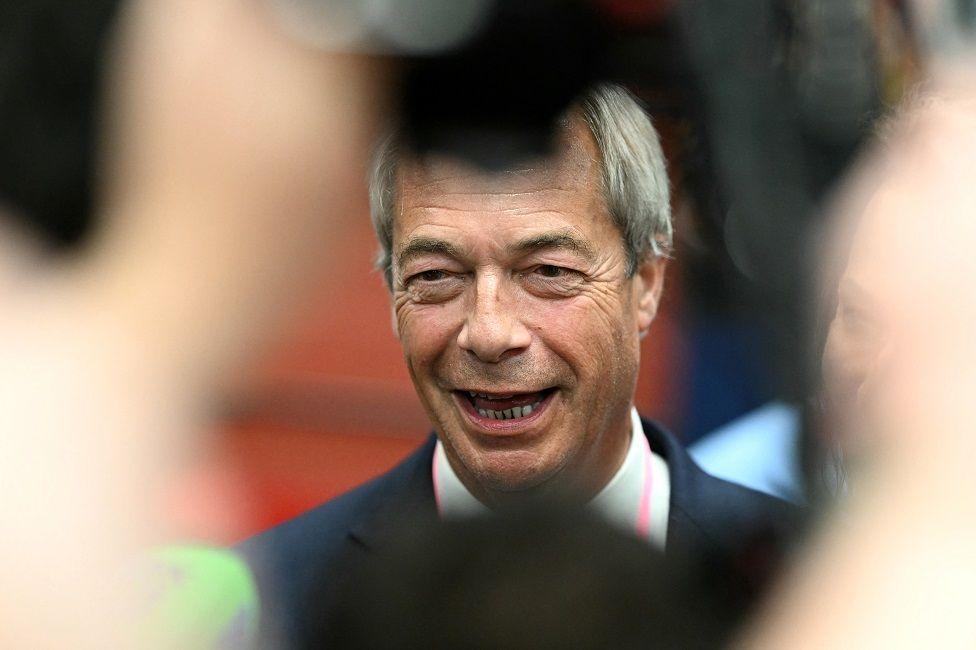Bruised Tories and Labour left working out how to tackle Reform

- Published
Boy, it was close. Mighty close.
Thursday night at the DCBL stadium in Widnes turned into the early hours which turned into Friday breakfast time, as volunteers carried out a full recount of the 32,655 votes cast in the Runcorn and Helsby by-election.
Shortly after half five in the morning Nigel Farage turned up, as did the Reform candidate Sarah Pochin and the Labour candidate Karen Shore – and by that point the facial expressions told the story.
Reform knew they had won - just.
And for Labour, dejection.
This is still an emerging picture - Runcorn was the only Parliamentary by-election held on Thursday and there are many more election results to come later today, including in parts of England where the Liberal Democrats expect to make big gains in local councils, for instance.
But right now it's the story of Reform UK that rightly dominates.
Nigel Farage's latest party is proving, so far at least, that healthy opinion poll figures can translate into actual votes and – in some places at least -- actual victories.
Crucially, in terms of the wider political implications, these results are an indication too that Reform can prove to be an equal opportunities threat to both the Conservatives and Labour.
The key thing to look at is the trend: Reform are frequently stacking up, whether they won or not, between a fifth and a third of the vote in the some of the key tussles so far.

Reform squeaked over the line in the by-election, but it is worth looking at their share of the vote where they didn't win.
In the mayoral contests declared so far, they were second in Doncaster with 31% of the vote, they were second on North Tyneside with 29% of the vote and they were second in the West of England with 22% of the vote.
They managed 42% in Lincolnshire, where the former Conservative minister Dame Andrea Jenkyns has been elected the county's first elected mayor.
Farage will now need to adjust to a new level of scrutiny - scrutiny of a governing record.
His rivals hope that that might prove tricky.
"How do a bunch of individualists and contrarians actually get on with running stuff?" asked one Labour source I was talking to.
A Conservative source texts: "Farage is obviously jubilant.
"But once the glow of victory dims, Nigel will be hoping Sarah Pochin and Andrea Jenkyns toe the line."
They add "how long might it be before we see the Independent Mayor of Lincolnshire taking her former party to court?,", in reference to Mr Farage's spectacular falling out with his former MP Rupert Lowe.
It is a particularly bleak day for the Conservatives. Having already endured a tough set of results overnight, they are braced for more grim news later in their former rural heartlands where the Liberal Democrats smell blood.
As for the government, we can already hear how they are trying to recalibrate.
There is no doubt they have taken a hit, but perhaps it could have been worse – they did win in Doncaster, North Tyneside and the West of England.
Expect to see now a focus on delivery, and projecting a sense of activity.
Government folk I speak to point to immigration plans that are in the offing, the spending review, the defence review, their industrial strategy – all coming before the summer.
The thing is, when they talk about delivery, it is some of the things they have actually delivered that caused them a headache, such as removing the Winter Fuel Payment from most pensioners.
There are plenty more results to come, but make no mistake, these elections will shape the tone, tenor and focus of the political conversation in the months to come; the government and the Tories staring, sleep deprived, hard into the mirror and working out how to respond.

Sign up for our Politics Essential newsletter to keep up with the inner workings of Westminster and beyond.